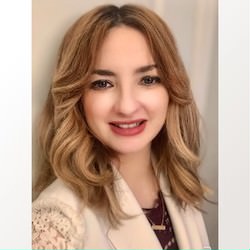
By Kimberley Clementi
Be positive. Be confident. Be adventurous. And be yourself – all while helping others do the same.
This is the mindset new assistant teaching professor Mai ElSherief brings to UC San Diego’s Computer Science and Engineering Department. ElSherief arrived in San Diego in June after completing a postdoctoral fellowship at the Georgia Institute of Technology.
A 2019 Ph.D. graduate of UC Santa Barbara, ElSherief is delighted to return to California’s sunny coastline. ElSherief acknowledges that completing her Ph.D., moving multiple times and adapting to teaching on Zoom – all during COVID – was stressful. This has made San Diego’s sunshine and outdoor activities even more inviting.
And then there was the UC San Diego campus itself.
“I did a campus tour. And for me that completed the interview experience. It was amazing,” says ElSherief. “The ocean is close. And the building itself, on the inside, is very cheerful. I really like it here.”
An opportunity for excellence, and collaboration
Sunshine was only part of the equation ElSherief considered before joining the UC San Diego CSE department. The reputation of UC San Diego and its excellence in computer science made her calculation a “no brainer,” she says. Ultimately, the CSE department’s collaborative culture was the determining factor.
“I experienced UC San Diego CSE’s culture firsthand during the interview process. And it was compelling. It was off the charts,” says ElSherief. “I was looking for a department where collegiality is something that everyone engages in.”
ElSherief’s contributions to the field explore connections between the theory of computer science and practical social problems. Throughout her Ph.D. and postdoctoral fellowship, ElSherief studied discriminatory speech, gender bias and hate speech in social media and news websites – a body of research that has proven uncannily relevant and timely during COVID.
ElSherief examines these and other online social complexities through Natural Language Processing (NLP). Using computational models, NLP gives computers the ability to understand text and spoken words by breaking sentences into basic parts and tagging them. The models then comb through data looking at words and combinations of words, trying to capture the semantic meanings.
Despite a research focus on abuses within online messaging, ElSherief views social media as a cultural positive. She notes that social media enables us to connect with others and access social support. ElSherief hopes her research will facilitate social media’s beneficial applications while reducing cyber bullying and misinformation.
“I’d like to see my work be a part of creating a safe environment for people to engage in online discussions,” says ElSherief. “I know these discussions have different points of view. But what I’m trying to do is minimize the harm and dangerous behaviors that happen online.”
ElSherief believes that language models can be applied to a vast array of real-life problems. In fact, that is precisely what she considers the key to inspiring her students. ElSherief challenges undergrad and graduate students to look beyond operands and operations to their day-to-day applications.
“You can use CS to do something meaningful in life,” says ElSherief. “By showing [students] there are a lot of hard problems that could use NLP, I think it will spark their interest more and make them more engaged in the material.”
Be the change you seek
Engaging students is ElSherief’s “mission.” To that end, she incorporates a variety of teaching tools in her classrooms, including video clips, breakout groups for peer interaction and frequent polls to assess learning and make real time adjustments.
“I want to create a research immersive experience for students – especially during their undergraduate studies. Right now, I’m co-directing the early research scholars program (ERSP) with Christine Alvarado (teaching professor and Associate Dean for Students at the Jacobs School of Engineering and the founder of the ERSP program at UC San Diego).”
ElSherief is working with Alvarado on the program to attract a broader range of students to computer science research, particularly minorities. She is looking forward to having Alvarado as her faculty mentor during her career at UC San Diego and acknowledges a long chain of colleagues and mentors who have contributed to her own individual success.
“When I was younger, I was always looking for a role model and a source of motivation to inspire me to become a leader in academia, research, teaching. The whole package,” says ElSherief.
Today, planning for her first day at CSE, ElSherief speaks enthusiastically about inspiring women and minorities. Sharing ideas. Solving real-world problems. She is brimming with ideas and enthusiasm.
“Be the person you needed when you were younger,” ElSherief quotes her favorite line from social media influencer Ayesha Siddiqi.

